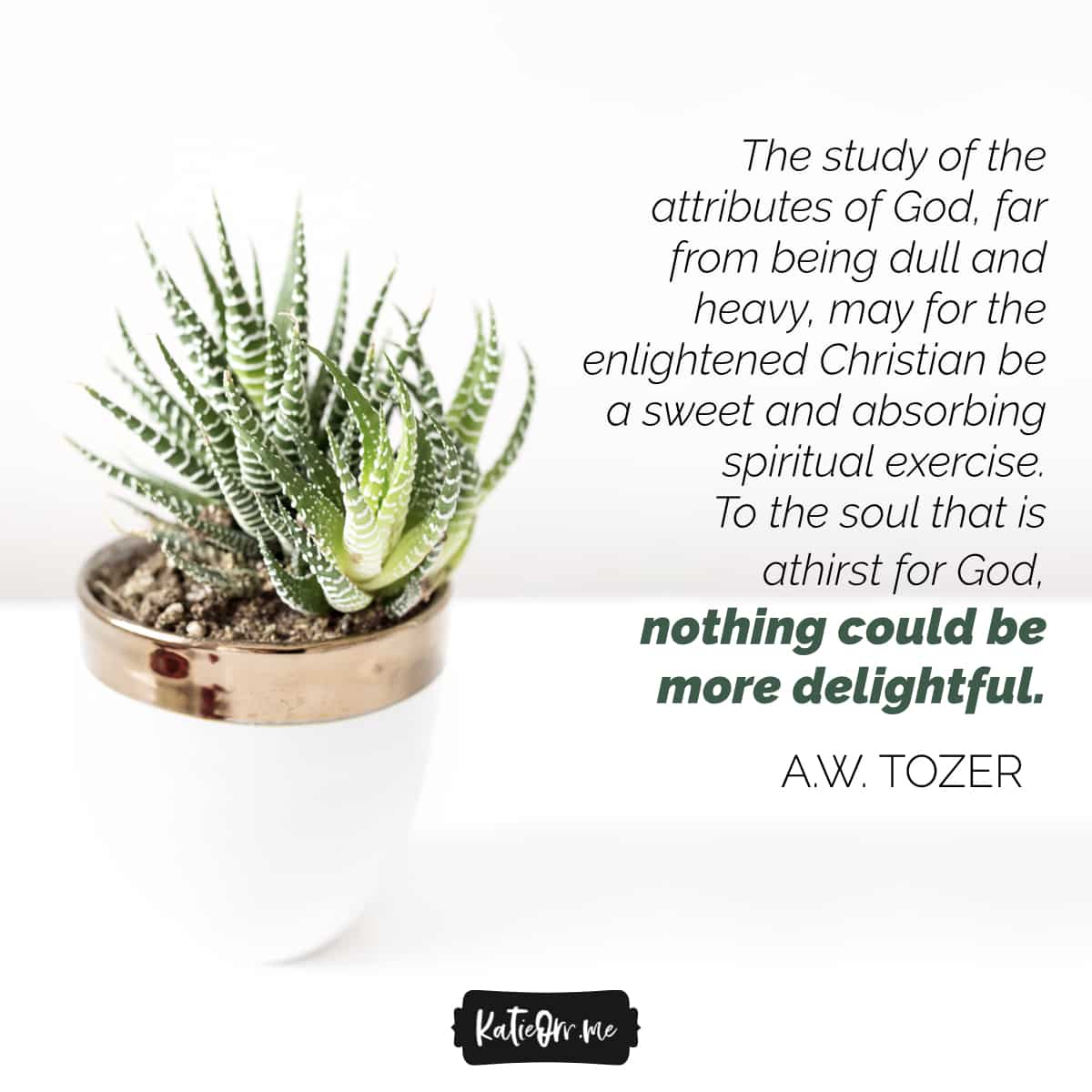I’ve long said that we need to stop “trying harder” and focus our efforts on “believing better.” For years, I tried and tried and tried to be good—sure I was going to get it right this time. Yet when I failed (and I always did), I was surprised and disappointed in myself. I looked around, and it seemed like everyone else had it all figured out … they must know something I don’t. Or maybe they are simply working harder at being good. I need to try harder. Then I’ll quit messing up so much.
Finally, I heard about grace and I stopped trying so hard to be good, and I began to rest in His goodness. And the more time I spent with Him, the more I desired more. I started actually reading Bible verses about God and realized that my view of God was way off from what His Word tells us.
“It is impossible to keep our moral practices sound and our inward attitudes right while our idea of God is erroneous or inadequate” — A.W. Tozer, [earnist_link ref=”the-knowledge-of-the-holy-the-3″ id=”19020″]The Knowledge of the Holy[/earnist_link]
I believe the greatest measure of spiritual growth is not how good we’ve become. The most accurate marker of our maturity in Christ is the way we see our God. If our view of Him is small, so will be our faith. When our mind’s eye sees God as small and indifferent, our heart’s cry for Him will be the same.
“What comes into our minds when we think about God is the most important thing about us” — A.W. Tozer, [earnist_link ref=”the-knowledge-of-the-holy-the-3″ id=”19020″]The Knowledge of the Holy[/earnist_link]
Yes! Yes! Yes!
These quotes are from a gem of a book—[earnist_link ref=”the-knowledge-of-the-holy-the-3″ id=”19020″]a small yet deep survey of who God is[/earnist_link]. This is one of those books that would be fruitful to read yearly. There is so much that we can learn from this classic.
Here are 10 of my favs from A.W. Tozer’s [earnist_link ref=”the-knowledge-of-the-holy-the-3″ id=”19020″]The Knowledge of the Holy[/earnist_link].

Knowledge of the Holy
“When the Scripture states that man was made in the image of God, we dare not add to that statement an idea from our own head and make it mean ‘in the exact image.’ To do so is to make man a replica of God, and that is to lose the unicity of God and end with no God at all. It is to break down the wall, infinitely high, that separates That-which-is-God from that-which-is-not-God” (p. 7).
“We can never know who or what we are till we know at least something of what God is. For this reason the self-existence of God is not a wisp of dry doctrine, academic and remote; it is in fact as near as our breath and as practical as the latest surgical technique” (p. 28).
“Need is a creature-word and cannot be spoken of the Creator” (p. 32).
“There is no reason for us to try to discover what has not been revealed. It is enough to know that God is God” (p. 46).
“How completely satisfying to turn from our limitations to a God who has none” (p. 47).
“The immutability of God appears in its most perfect beauty when viewed against the mutability of men. In God no change is possible; in men change is impossible to escape” (p. 50).
“God knows instantly and effortlessly all matter and all matters, all mind and every mind, all spirit and all spirits, all being and every being, all creaturehood and all creatures, every plurality and all pluralities, all law and every law, all relations, all causes, all thoughts, all mysteries, all enigmas, all feeling, all desires, every unuttered secret, all thrones and dominions, all personalities, all things visible and invisible in heaven and in earth, motion, space, time, life, death, good, evil, heaven, and hell” (p.56).
“All God’s acts are done in perfect wisdom, first for His own glory, and then for the highest good of the greatest number for the longest time” (p.60)
“God’s holiness is not simply the best we know infinitely bettered. We know nothing like the divine holiness. It stands apart, unique, unapproachable, incomprehensible and unattainable. The natural man is blind to it. He may fear God’s power and admire His wisdom, but His holiness he cannot even imagine” (p. 104).
“God is said to be absolutely free because no one and no thing can hinder Him or compel Him or stop Him. He is able to do as He pleases always, everywhere, forever” (p. 109)
